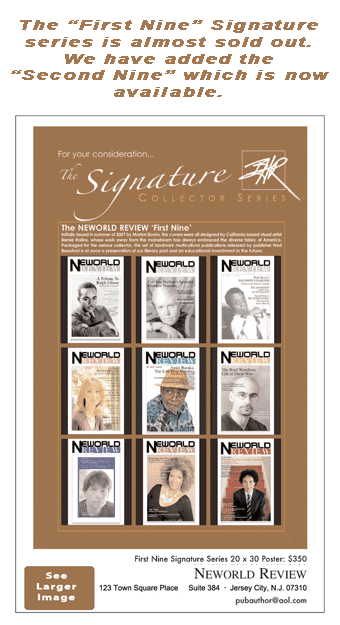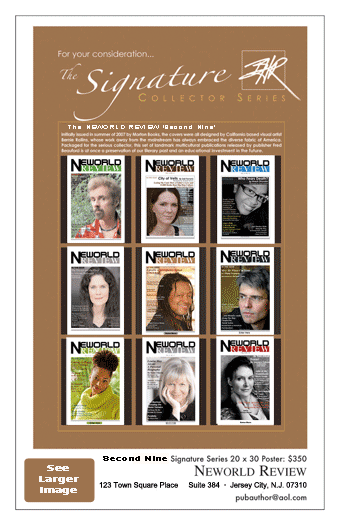
MEMOIR
THE LAST HOLIDAY
by Gil Scott-Heron
Grove Press | 2011 | 321 pages | $25.00
Reviewed by Robert Fleming
When Gil Scott-Heron, the acclaimed jazz poet, died last year, some critics talked about another waste of genius vaporized by drugs, for everyone knew of his troubles with coke, crack and jail time. But another thing was lost and that was the magic which ;was his raspy voice declaring his political and cultural lyrics over a pulsing, percussive beat.
Now, Scott-Heron's final book, "The Last Holiday," appears just in time for the birthday of one of his heroes, Rev. Martin Luther King. It is a new, posthumously published memoir hastily assembled for the marketplace
The singer/poet toured with Stevie Wonder for 41-days in 1980 to drum up support for a national holiday commemorating the fallen spokesman for the Civil Rights Movement, Dr. Martin Luther King Jr.
There have been several incarnations of this memoir but this is the one selected for our bookshelves. "I always doubt detailed recollections authors write about their childhoods," Scott-Heron writes in his prologue. "Maybe I am jealous that they retain such clarity of their long ago while my own past seems only gone."
Even if Scott-Heron didn't collect photos or mementos, he accurately details his childhood including family life with his mother and grandmother, and his absent father, Gilbert. His parents separated when he was about two years old. Her mother, Bobbie, went to Puerto Rico to teach English while he lived with his grandmother in the South. He listened to the blues on WDIA, the nation's first black radio station from Memphis and played hymns on a piano at an early age.
Growing up in the South in the Jim Crow era was not fun. He was just another poor black boy, so when he found his grandma dead, his mother returned and came north to New York City. He would never forget his grandmother, Lily Hamilton, the laundress who taught him so much. The years passed quickly. Scott-Heron does not dwell on any event until he speaks about going to Lincoln University, where the poet Langston Hughes had attended years ago.
It was where he met Brian Jackson, his writing partner and band mate. They made nine records together before that union went bust. While there, he was very productive; he wrote his first book of verse, "Small Talk at 125th and Lenox," and two novels, The Vulture and The Nigger Factory. Labeling Scott-Heron"very charismatic and absolutely unique," Clive Davis signed him to the Arista label, one of the first artists on the roster in 1975. Between 1970 and 1985, Scott-Heron made thirteen albums, including the hits "The Revolution Will Not Be Televised," "The Bottle," and "Angel Dust." In the book, the singer delves into the business of publishing, the music industry, and performance like an experienced entertainer, writing of the difficulties of touring and promotion.
However, Scott-Heron's star began to soon fade and later his friends and associates noticed he was wrestling with addiction. In later years, he was convicted twice for cocaine possession, missing a parole hearing, and assault on a girlfriend.
The music experiences in the book receive more attention that the introspective elements of the singer. He never lets the reader into his soul. He never permits us a deep glimpse of his inner life. He never gives a motive for his descent into drug addiction or his personal relationships.
A New Yorker profile allowed some insights into Scott-Heron's diminished life in the ground floor Harlem apartment where he watched cartoons and took hits off a crack pipe. Thin and shrunken, the singer continued to perform and compose, while suffering from HIV. He made no excuses for how his life ended up. "The mistakes have been due to my own judgment both of people and circumstances."
Tributes called Scott-Heron, after his death at age 62 following a European tour, the honored tag of "The Godfather of Rap." He loved that the rap stars sampled his music but he termed himself "a blueslogist."
However, rapper Chuck D said, "You can go into the beat poets and Ginsberg and Dylan, but Gil Scott-Heron is the manifestation of the modern world. He and The Last Poets set the stage for everyone else."
As the father of three, Scott-Heron looked back over his 30-year career with this book stressing the high points of performing his music at the expense of himself. Like The Last Poets, his music reflected the rage and bitterness of a generation betrayed by an uncaring government and antiquated laws.
He was a cultural icon. His memoir only hints at the greatness and creativity that was his. Still, it is a book that reflects upon a sad and glorious hymn of failed potential and regret, yet it celebrates another survivor who contributed mightily to our cultural legacy.




